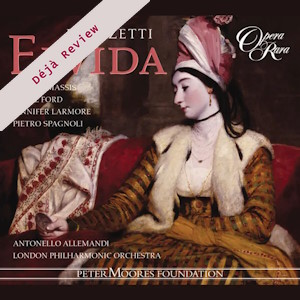
Déjà Review: this review was first published in March 2005 and the recording is still available.
Gaetano Donizetti (1797-1848)
Elvida, Melodramma in one act. Libretto by Giovanni Schmidt.
Amur, head of a tribe of Moors, Pietro Spagnoli (bass); Zeidar, his son, Jennifer Larmore (mezzo-soprano); Elvida, a noble Castilian maiden, Annick Massis (soprano); Alfonso, a Castilian prince, Bruce Ford (tenor); Zulma, Amur’s slave, Anne-Marie Gibbons (mezzo-soprano); Ramiro, an officer of Alfonso, Ashley Catling (tenor)
Geoffrey Mitchell Choir
London Philharmonic Orchestra/Antonello Allemandi
rec. 2004, Henry Wood Hall, London
Opera Rara ORC29 [66]
2005 seems to be set to be a premier Donizetti year for Opera Rara. This Elvida, of 1826, and number 16 in the composer’s canon of operas, is issued in the same month as his Francesca di Foix of 1831. Already recorded, and due for release in September, is Pia de’ Tolomei (1837). Dom Sebastian, Donizetti’s last completed opera, presented in Paris in 1843, and his sacred tragic opera Il diluvio universale (The great flood, 1830) are scheduled for recording later this year.
Five of Opera Rara’s first ten recordings of complete operas were of works by Donizetti, the first in 1977 being Ugo conte di Parigi (ORC 1). Since that time their repertoire has extended to encompass the works of Rossini and Donizetti’s contemporaries, Meyerbeer (1791-1864), Mercadante (1795-1870) and Simone Mayr (1763-1845). Mayr was Donizetti’s teacher; neither a contemporary nor a rival. He set up a conservatory in Bergamo, Donizetti’s birthplace, in 1806 and the young Gaetano attended, free of charge, for eight years. Mayr’s altruism extended to passing to Donizetti a contract that saw the latter achieve his first big operatic success with Zoraida di Granata (Opera Rara ORC 17) in Rome in January 1822. This established the young composer on the highly competitive compositional ladder. The great impresario of the time, Domenico Baribaia, offered Donizetti a contract for Naples. His first opera in that town, La zingara (1822) was a great success. During the next four hectic years Donizetti composed a further five operas for presentation in Naples, as well as works premiered in Rome, Milan and Palermo.
On his return to Naples from Palermo, Donizetti’s next commission was for a one-act opera seria for the Teatro San Carlo. The work was to be staged as part of a mixed programme on the birthday, and in the presence, of Queen Maria Clementina. Like many such ‘pièces d’occasion’ it received scant attention and after a further three performances it was forgotten. The plot tells a simple story of a Spanish noblewoman, Elvida (sop), who is captured by a Moorish chieftain, Amur (bass). Elvida resists the attentions of the Chieftain’s son Zeider, a travesty role (mezzo), and is rescued by her fiancé Alfonso (ten). As is noted in various sources and by Jeremy Commons in his usual informative and erudite booklet essay, Donizetti approached the commission with little enthusiasm. However, he had three of the greatest singers of the time at his disposal. One was the tenor Rubini, creator of several roles for Donizetti and Bellini. Donizetti wrote to Mayr that he hoped to impress with Rubini’s cavatina (trs. 13-14) and the quartet (trs. 20-21). The Rubini role, fiancé Alfonso, is sung here by Opera Rara’s ‘house’ tenor Bruce Ford. In the aria itself Atre nube al sole intorno (a black cloud hangs about the sun, tr. 13) he sings with fine open tone managing the decorations and fioritura with aplomb. In the following caballeta Cara imaginin del mio (‘Dear image of my beloved’, tr. 14) his tone is a little squeezed. However, he launches the quartet (tr. 20) with fine heady tone and his usual exemplary diction is evident throughout. Donizetti was correct in respect of both the tenor solo and the quartet. Both are fine pieces of writing, particularly the dramatic quartet with concluding high note for the soprano. At the original performance the Flemish soprano Henriette Méric-Lalande, renowned for her supple voice and ability in coloratura, sang the role of Elvida. In this performance Annick Massis’ voice seems to me to have gained in richness and variety of colour without loss of flexibility. There is not a lot of character to be got into the part but she sings with purity, trills well and is comfortable in the coloratura demands (trs. 6-7). She perhaps needs to pay a little more attention to diction although I recognise that singing so far up the stave poses particular physical problems for sopranos. As the amorous son, Jennifer Larmore’s smooth creamy singing is heard to good effect in her duet with Annick Massis (trs. 9-10) where, at one point, they match note for note. Pietro Spagnoli sings the role of Amur, originally taken by Luigi Lablache. His lightish bass is clear and even, much in the vein of ‘house’ regular Alastair Miles. He sings with commendably even legato and admirable diction to complement his smooth tone. He is a welcome addition to Opera Rara’s singer roster.
Jeremy Commons remarks that this opera might not be Donizetti at his greatest; sometimes, to my ears, the music sounds inappropriately jolly (tr. 12). The vibrant orchestral playing under the baton of Antonello Allemandi, allied to the committed chorus contribution to go with the excellent solo singing, overcome any minor reservations. I shall return to this recording for bel canto indulgence and pleasure. It is a worthy and welcome addition to the availability of Donizetti’s operatic oeuvre on disc. I strongly recommend all lovers of the composer’s music and the bel canto genre to add it to their collections. Opera Rara provide the usual luxury packaging and there is a full libretto with English translation.
Robert J Farr
Help us financially by purchasing from


















